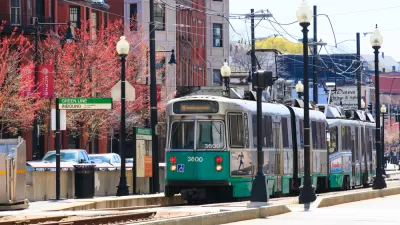New analysis explores every city and suburb in the Boston region to reveal the tools of multi-family housing obstruction—sometimes it takes more than zoning to block apartments from getting built.

"Thanks to a thicket of zoning rules, the suburban communities of Greater Boston have lots of ways to make it difficult to build apartments and other multifamily housing that many of their residents don’t want," writes Tim Logan.
That thicket has become much more defined, thanks to new research by a coalition of major housing industry and advocacy groups that provides a comprehensive review of zoning laws in Eastern Massachusetts. To complete the "The State of Zoning for Multi-Family Housing in Greater Boston" report, researcher Amy Dain examined the zoning codes and housing plans of 100 Eastern Massachusetts municipalities.
In Dain's own words, quoted in the article, the report attempts to define "the aggregate, de facto plan for building multifamily housing across Greater Boston." To summarize the findings of the report, Dain uses the phrase "paper wall" to describe the regulations, like lot size requirements, parking minimums, age restrictions — that block multifamily housing even in places where zoning allows for it.
Logan provides an example of how extra regulations can sometimes supersede the nominal intentions of zoning in the Boston area:
The Town of Dover, for instance, technically allows apartment buildings but requires that 25 percent of units in a new building be affordable, that 40 percent be set aside for senior citizens, and that the project contain no more than four units per acre — a density more common to single-family homes with yards. No project has ever been permitted in Dover under those rules, Dain noted.
According to Logan, one prescription suggested in the report is a more regional approach to planning.
FULL STORY: Study highlights local rules that block new housing in Greater Boston

Maui's Vacation Rental Debate Turns Ugly
Verbal attacks, misinformation campaigns and fistfights plague a high-stakes debate to convert thousands of vacation rentals into long-term housing.

Planetizen Federal Action Tracker
A weekly monitor of how Trump’s orders and actions are impacting planners and planning in America.

In Urban Planning, AI Prompting Could be the New Design Thinking
Creativity has long been key to great urban design. What if we see AI as our new creative partner?

King County Supportive Housing Program Offers Hope for Unhoused Residents
The county is taking a ‘Housing First’ approach that prioritizes getting people into housing, then offering wraparound supportive services.

Researchers Use AI to Get Clearer Picture of US Housing
Analysts are using artificial intelligence to supercharge their research by allowing them to comb through data faster. Though these AI tools can be error prone, they save time and housing researchers are optimistic about the future.

Making Shared Micromobility More Inclusive
Cities and shared mobility system operators can do more to include people with disabilities in planning and operations, per a new report.
Urban Design for Planners 1: Software Tools
This six-course series explores essential urban design concepts using open source software and equips planners with the tools they need to participate fully in the urban design process.
Planning for Universal Design
Learn the tools for implementing Universal Design in planning regulations.
planning NEXT
Appalachian Highlands Housing Partners
Mpact (founded as Rail~Volution)
City of Camden Redevelopment Agency
City of Astoria
City of Portland
City of Laramie





























